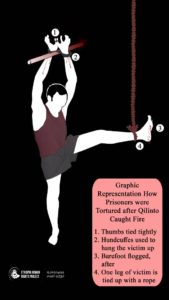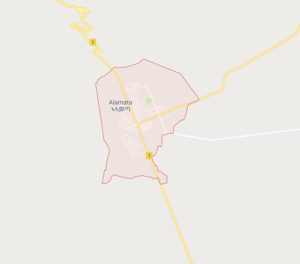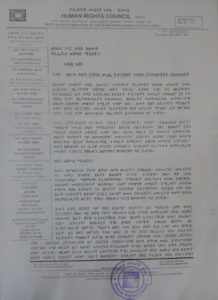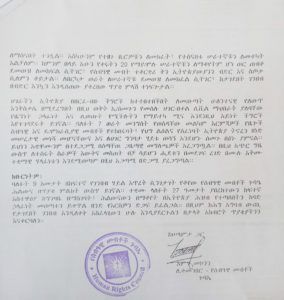የሰብዓዊ መብቶች ጉባኤ (ሰመጉ) 146ኛ ልዩ መግለጫን ተከትሎ በተቋሞቻችሁ በኩል ለቀረቡት ቅሬታዎች የተሰጠ ምላሽ። ሙሉ ምላሹን በፒዲኤፍ እዚህ ያገኛሉ።
Latest Posts
በወቅታዊ የሀገራችን ሁኔታ ላይ ከሰመጉ የተሰጠ ጋዜጣዊ መግለጫ በአገሪቱ በአንዳንድ አካባቢዎች በተለያዩ ምክንያቶች እየተቀሰቀሱ ያሉ ግጭቶች ዘላቂ መፍትሄ ይፈለግላቸው!
የሰብዓዊ መብቶች ጉባዔ (ሰመጉ) ከዚህ ቀደም በተደጋጋሚ በሀገራችን የተለያዩ አካባቢዎች ለሚከሰቱ በተለይም ከማንነት ጋር የተያያዙ ግጭቶችና ጥቃቶች ዘላቂና የማያዳግም መፍትሄ እንዲሰጣቸው፤ እንዲሁም በግጭቶቹ እና በጥቃቶቹ በቀጥታም ሆነ በተዘዋዋሪ እጃቸው ያለበት አካላት በህግ ተጠያቂ እንዲደረጉ ለሚመለከታቸው የመንግስት አካላት ሲያሳስብና ሲጠይቅ መቆየቱ ይታወሳል። ይሁንና ግጭቶቹና ጥቃቶቹ በተለያዩ አካባቢዎች ተባብሰው እየቀጠሉ እንደሚገኙ ከተለያዩ የሀገሪቱ አካባቢዎች ለሰመጉ የሚቀርቡ አቤቱታዎችና ሪፖርቶች ያመላክታሉ። ከጥቅምትና ህዳር ወር 2011 ዓም ጀምሮ በተለያዩ የሀገሪቱ አካባቢዎች የሰው ህይወት መጥፋት፣ የአካል ጉዳት፣ የንብረት መውደም፣ መፈናቀልና የተለያዩ ጉዳቶች ተፈፅመዋል፤ አሁንም እየተፈፀሙ ይገኛሉ። ከዚህ በታች የተዘረዘሩትም ይህንን ያመላክታሉ፤
- በኦሮሚያ ብሄራዊ ክልላዊ መንግስት ቦረና ዞን ሞያሌ ከተማ በገሪና ቦረና ጎሳዎች መካከል ባለው ግጭት ከህዳር ወር መጀመሪያ ጀምሮ ከ50
በላይ የሰዎች ህይዎት ጠፍቷል፣ ከፍተኛ የአካል ጉዳትና የንብረት ውድመትም ደርሷል። ከዚህ በተጨማሪ ታህሳስ 8 ቀን 2011 ዓ.ም ሞያሌ
ከተማ በቀለ ሞላ ሆቴል ውስጥ በታጣቂዎች በተፈፀመ ጥቃት የ12 ሰዎች ህይዎት ጠፍቷል። በነቀምቴ፣ በነጆ፣ ጋሆ ቄቤ፣ በሀሮ ሊሙ
በሚንቀሳቀሱ ታጣቂዎች በተፈፀሙ ጥቃቶች ከ30 በላይ ሰዎች ህይወት የጠፋ ሲሆን አንድ ሰው ቆስሏል። መንግስት በአካባቢው የሚገኙ የኦነግ
ታጣቂዎች ድርጊቱን እንደፈፀሙት ቢያመላክትም እስካሁን ማረጋገጫ አልተገኘለትም። በ17/04/2011 ዓ.ም የጊቶ ጊዳ ወረዳ ምክትል አስተዳዳሪናየግብርና ፅ/ቤት ሀላፊ ባልታወቀ አካል በነቀምቴ ከተማ ውስጥ ተገድለዋል። በዚሁ እለት በነቀምቴ ከተማ በመንግስት የፀጥታ ሀይሎች 2 ሰዎች ተገድለዋል። - በአማራ ብሄራዊ ክልላዊ መንግስት ምዕራብ ጎንደር ዞን ከህዳር 22 ቀን 2011 ዓ.ም ጀምሮ በጭልጋና በደንቢያ አካባቢዎች በአማራና በቅማንት
ማህበረሰብ መካከል በተነሳ ግጭት ቢያንስ የ50 ዜጐች ህይወት አልፏል፣ ከፍተኛ የሆነ ንብረት መውደምና ቃጠሎ ደርሷል፣ ዘረፋና ማፈናቀል
ተፈፅሟል። በአሁኑ ሰዓትም ከፍተኛ የጸጥታ ችግር ያለ ሲሆን የክልሉ መንግስት ችግሩን ለመፍታት ወንጀለኞችን በህግ ቁጥጥር ስር እያዋለ
እንደሚገኝ ከአካባቢው ለሰመጉ የደረሱት መረጃዎች ያመላክታሉ። - ሲዳማ ዞን በንሳና ቦና ወረዳዎች “መሬታችን ለኢንቬስተር አላግባብ ተሰጥቷል” በሚል ምክንያት የተፈጠረ አለመግባባት በወረዳው ካቢኔ
አንመራም ወደሚል ተቃውሞ ተሸጋግሮ ከህዳር ወር አጋማሽ ጀምሮ በተቃውሞ ላይ የነበሩ 29 የሀገር ሽማግሌዎች በበንሳ ፖሊስ ጣቢያታስረው
ይገኛሉ፤ በዞኑ በሊላ ወረዳ ከምዕራብ ጉጅ ዞን በሚያዋስን ድንበር ላይ ከህዳር ወር ጀምሮ በተፈጸመ ጥቃትና ግጭት ከ25 እስከ 35 የሚገመት
የሰው ህይዎት መጥፋቱን፤ በሚሊዮን ብር የሚገመት የግልና የመንግስት ንብረት መውደሙን የሰመጉ ምንጮች ገልፀዋል። - በምዕራብ ጉጂ ዞንና በደቡብ ክልል ቡርጂ ወረዳ ከ03/04/2011ዓ.ም ጀምሮ በታጠቁ ኃይሎች በተፈፀመ ጥቃት የ13 ሰዎች ሕይወት ጠፍቷል፤
የአካል ጉዳት ደርሷል፤ ግምቱ ያልታወቀ ንብረት ተዘርፏል፤ - በጉራጌ ዞን በመስቃንና ማረቆ ማህበረሰብ መካከል ከመስከረም 03 ቀን 2011 ዓም ጀምሮ በተፈፀሙ ግጭቶች ቁጥራቸው ከ50 (ሃምሳ) በላይ
ዜጐች ህይወት ጠፍቷል፣ በሰው አካል እና ንብረት ላይ ከፍተኛ ጉዳት ደርሷል፤ በርካታ ዜጐችም ከመኖሪያ ቀያቸው ተሰደዋል። ከችግሩ ጋር
በተያያዘ የሁለቱም ወረዳ አስተዳዳሪዎችና የመንግስት ሰራተኞች በቁጥጥር ስር ዉለው ምርመራ እየተደረገባቸው ይገኛል። - የራያ ህዝብ የማንነት ጥያቄ ያነሱ ዜጐች በጥቅምት ወር መጀመሪያ ጀምሮ ሰላማዊ ሰልፍ በመውጣታቸው ምክንያት የ5 ዜጐች ህይወት ማለፉን
ገልፆ ሰመጉ ጋዜጣዊ መግለጫ ማውጣቱ ይታወሳል። ከዚሁ የራያ ህዝብ የማንነት ጥያቄ ጋር በተያያዘ ከጥቅምት ወር ጀምሮ 761 የማህበረሰቡ
ተወላጆች መቀሌ፣ ማይጨው፣ ውቅሮ፣ ተንቤን ውስጥ በሚገኙ የተለያዩ እስር ቤቶች ታስረው እንደሚገኙ የራያ የማንነት ጥያቄ አስተባባሪ
ኮሚቴ ለሰመጉ ገልጿል፤ - በደቡብ ክልል አማሮ ኬሌ ወረዳ በአማሮና በጉጂ መካከል ከሁለት አመት በላይ በቀጠለ ግጭት በርካታ ሰዎች ተገድለዋል፣ ቤት ንብረታቸው
ወድሟል። በ10/04/2011 ዓ.ም የአማሮ አርሶ አደሮች ንብረት የሆኑ 156 ከብቶች በጉጂዎች በመወሰዳቸው ግጭት ተቀስቅሶ የአማሮ ኬሌ ተወላጅ
የሆነ አንድ አርሶ አደር ህይወት ማለፉን ሰመጉ አረጋግጧል፤ - ከቤኒሻንጉል ጉሙዝ ክልል በያሶን ወረዳ ይኖሩ የነበሩ ቁጥራቸው 1,200 የሚሆኑ የአማራ ብሄር ተወላጆች ተፈናቅለው ከህዳር 15 ቀን 2011 ዓም
ጀምሮ ባህርዳር ከተማ ዘን ዘልማ በሚገኝ የገበያ ማዕከል ተጠልለው ይገኛሉ፤ - በቦረና ዞን ተልተሌ ወረዳ በሚኖሩ የቡርጂና ኮንሶ ተወላጆች ታህሳስ 10 ቀን 2011 ዓ.ም በቦረና ተወላጆች መኖሪያ ቤቶቻቸው ተቃጥሎ
አካባቢውን ለቀው እንዲወጡ ተደርገዋል። ተፈናቃዮቹም ጃርሶ ቀበሌ ተጠልለው ቢገኙም፤ ከዚህም ቦታ ለቀው እንዲሄዱ የተለያዩ ጫናዎች
እየተደረገባቸው መሆኑን ከአካባቢው ለሰመጉ የደረሱት መረጃዎች ያመላክታሉ፤ - ጥቅምት 18 ቀን 2011 ዓ.ም በድሬዳዋ ከተማ በገንደ ገራዳ፣ ገንዳ ቦዬ እንዲሁም ገንደ ተስፋ የተባሉ አካባቢዎች ከህገ ወጥ የመሬት ወረራና
እንዲሁም ከጸጥታ ኃይሎች ጋር በተፈጠረ ግጭት ፖሊስም ሁኔታውን ለማረጋጋት በወሰደው እርምጃ የሁለት ሰዎች ህይዎት አልፏል። 6 ሰዎች
ጉዳት ደርሶባቸው በድል ጮራ ሆስፒታል ህክምና ላይ ይገኛሉ፤ - ጥቅምት 21 ቀን 2011 ዓ.ም ድሬዳዋ ዙሪያ ቢራ የሚባል ቀበሌ 1 ማህበር በኦሮሞና በሱማሌ ጎሳዎች መካከል በተፈጠረ ግጭት 12 የሚሆኑ ቤቶች
መቃጠላቸውን፣ እንዲሁም 4 ሰዎች በጥይት ተመተው ቆስለው በህክምና ላይ ይገኛሉ፤ - ታህሳስ 13/2011 ዓ.ም ጀምሮ በምስራቅ ኢትዮጵያ በሱማሌ ክልልና በኦሮሚያ ክልል አዋሳኝ በሆኑት ሲቲ ዞንና ምስራቅ ሃራርጌ ዞን የረር ጎታ
በሚባል አካባቢ ብሄርን መሰረት ያደረገ ግጭት ተከሰቶ የ5 ሰዎች ህይወት አልፏል፤ - በቡሌ ሆራ ዩንቨርሲቲ ከታህሳስ 4 ቀን 2011 ዓ.ም ጀምሮ ከአማራ ክልል የመጡ ተማሪዎችን በገጀራ፣ በጩቤና በፌሮ ብረት በማስፈራራትና
ድብደባ በመፈፀም ተማሪዎቹ ከማደሪያቸው መውጣታቸውን፣ አንድ ተማሪም ከሦስተኛ ፎቅ ወድቆ በደረሰበት ጉዳት ሆስፒታል ገብቷል። ወደ
ቤተሰቦቻቸው ለመመለስ እንደተከለከሉ የገለጹት ተማሪዎች ወደ ማደሪያቸውም ለመመለስ ያልቻሉ ሲሆን በዩንቨርሲቲው ግቢ ውስጥ
በመከላከያ ተከበው ጥበቃ እየተደረገላቸው ቆይተዋል። ችግሩን ለመቅረፍ ከሚመለከታቸው አካላት ጋር ውይይት ቢደረግም ተማሪዎች
ለደህንነታቸው ስጋት እንዳላቸው በመግለፅ ለ12 ቀናት ሜዳ ላይ ውለው ካደሩ በኋላ ዩኒቨርሲቲውን ለቀው ወደየቤተሰቦቻቸው ተመልሰዋል።
ግቢውን ለቀው ከመውጣታቸው በፊትም በተደራጁ ኃይሎች በድንጋይ ድብደባ እንደተፈፀመባቸው እና ከ10 በላይ ተማሪዎች በደረሰባቸው
ጉዳት ለህክምና መወሰዳቸውን ሰመጉ አረጋግጧል። - የወለጋ ዩኒቨርሲቲ ተማሪዎች በነቀምቴ፣ በነጆ፣ ጋሆ ቄቤ፣ በሀሮ ሊሙ በ03/03/2011 ዓ.ም ለሞቱ ዜጎች ሀዘናቸውን ለመግለጽ በ25/03/2011
ዓ.ም በወጡበት ወቅት 15 ዩኒቨርሲቲው ተማሪዎች በታጠቁ የመንግስት ኃይሎች በጥይት ተመተው አንዱ ህይወቱ ሲያልፍ 13 ሆስፒታል
ታክመው ወጥተዋል። አንድ ተማሪ በነቀምቴ ሪፈራል ሆስፒታል ተኝቶ ህክምናውን እየተከታተለ ይገኛል። - ጅማ፣ አምቦ፣ ደብረ ብርሃን፣ ድሬዳዋ ዩኒቨርሲቲዎች፤ እንዲሁም በሀዋሳ ከተማ አዲስ ከተማ መሠናዶ ትምህርት ቤት በተማሪዎች መካከል
ብሔርን መሠረት ያደረጉ ግጭቶች ተቀስቅሰው ተማሪዎች ጉዳት ደርሶባቸዋል፤ የመማር ማስተማር ሒደቱም በተለያየ ወቅት ተቋርጦ ቆይቷል።
ማጠቃለያ
በአጠቃላይ በአሁኑ ወቅት በተለያዩ የሀገራችን አካባቢዎች በተለያዩ ምክንያቶች በተለይም ከማንነት ጋር በተያያዘ ግጭቶች እየተባባሱ የበርካታ
ዜጎችን ህይወትና ንብረትን እያጠፋና ለዘመናት ከኖሩበት መኖሪያ ቀያቸው እያፈናቀለ ይገኛል። በተመሳሳይ ምክንያቶች በበርካታ ዩኒቨርሲቲዎች
ከማንነት ጋር በተያያዘ የሚነሱ ግጭቶች የተማሪዎችን ህይወት መጥፋት፣ አካላዊ እና ስነልቦናዊ ጉዳት እያስከተሉ ሲሆነ የመማር ማስተማሩ ሂደት
በበርካታ ዩኒቨርሲቲዎች እየተስተጓጎለ ይገኛል። እንዲሁም ብሄርን መሰረት ያደረጉ ጥቃቶች እንደቀጠሉ ለሰመጉ ከተለያዩ አካባቢዎች የሚደርሱት
መረጃዎች ያመላክታሉ። እየተባባሱ የመጡት ሁኔታዎች ሀገሪቱ እየተጓዘችበት ያለውን የለውጥ መንገድ ከማስተጓጐልም አልፎ አስከፊ ወደሆነ የእርስ
በርስ ግጭት ሊወስድ የሚችል እንደሆነ እየታየ ነው። ለግጭቶቹ መባባስ እና እየደረሰ ላለው ሰብዓዊ እና ቁሳዊ ውድመት በተለያዩ የሀገራችን
አካባቢዎች በስፋት እየተዘዋወረ ያለው ህገወጥ የጦር መሳሪያ እና ከህግ አግባብ ውጪ የጦር መሳሪያ የታጠቁ ዜጐች ከፍተኛውን ሚና እየተጫወቱ
ይገኛሉ። ላለፉት አመታት የመንግስት ታጣቂ ኃይሎች ይወስዱት የነበረው ያልተመጣጠነ የሃይል እርምጃ ጋብ ባለበት በዚህ ወቅት፤ በተለያዩ የሀገሪቱ
ክፍሎች ከህግ አግባብ ውጪ የጦር መሳሪያ የታጠቁ ኃይሎች በየቦታው ለሚታዩት ግጭቶች እና ውጥረቶች ምክንያቶች ሆነዋል።
በአንፃሩ መንግስት በዜጐች መካከል እየተባባሱ የመጡትን ብሔር-ተኮር ግጭቶች እና ጥቃቶች ሳይፈፀሙ ቀድሞ በመከላከል በኩልም ሆነ፤ ችግሮቹ
ከተፈጠሩ በኋላ በፍጥነት ተቆጣጥሮ የጉዳት መጠኑን ለመቀነስ እያደረገ ያለው ጥረት የችግሩን ስፋትና ጥልቀት የሚመጥን ሆኖ አልታየም። የዜጐችን
በሕይወት የመኖር መብት፣ የአካል ደህንነት መብት፣ በማንኛውን የሀገሪቱ ክፍል ያለገደብ ተንቀሳቅሶ የመኖር፣ የመስራት እና ንብረት የማፍራት ህገ
መንግስታዊ መብትን በመጠበቅ እና በማስከበር ረገድ ከፍተኛ ጉድለት ታይቶበታል። መንግስት በህገወጥ መንገድ ወደ ሀገሪቱ እየገባ ያለውን ቁጥሩ
ከፍተኛ የሆነ የጦር መሳሪይ ዝውውር በመቆጣጠር፣ የጦር መሳሪያውን ምንጭ በመግታት፣ ከህግ አግባብ ውጪ የጦር መሳሪያ በታጠቁ ሰዎች ላይ
ጥብቅ ክትትል በማድረግ እና ትጥቅ በማስፈታት በኩልም በሚጠበቅበት ደረጃ ሲንቀሳቀስ አልታየም። ግጭትን ቀስቃሽ ንግግሮች እና ማነሳሳቶች
በተለያዩ አካላት ሲፈፀሙም መቆጣጠር አልቻለም።
በሀገሪቱ በበርካታ አካባቢዎች እነዚህና ሌሎች ተመሳሳይ ግጭቶችና ጥቃቶች ለአመታት መንግስት ሲከተለው የነበረው ብሔርን እና ቋንቋን መሠረት
ያደረገ ፖለቲካ ውጤት መሆኑ አያጠያይቅም። መንግስት ብሔርን እና ቋንቋን መሠረት ያደረገውን የፌዴራል አደረጃጀት ክፍተቶች እና ችግሮች
በመመርመር ተገቢውን ማስተካከያ እንዲያደርግ ሰመጉ በተደጋጋሚ ሲጠይቅ መቆየቱ ይታወሳል፤ አሁንም በድጋሚ ይጠይቃል።
በመጨረሻም በተለያዩ አካባቢዎችና በዩኒቨርስቲዎች ውስጥ ዜጎች በሰላምና በመግባባት እንዳይኖሩ እንዲሁም ግጭቶችን በመቀስቀስ ለበርካቶች
ህይወት መጥፋት፣ የአካል ጉዳት፣ የንብረት መውደምና መፈናቀል በቀጥታም ይሁን በተዘዋዋሪ እጃቸው ያለባቸውን አጣርቶ በመለየት በህግ አግባብ
ተጠያቂ እንዲደረጉ፤ ለተጐጂዎች እና ቤተሰቦቻቸው ተመጣጣኝ ካሳ እንዲከፍል፤ በግጭቶቹ እና በደህንነት ስጋት ምክንያት ትምህርታቸውን ያቋረጡ
የዩኒቨርሲቲ ተማሪዎች ወደ ትምህርት ገበታቸው እንዲመለሱ አስፈላጊው ጥበቃ እንዲደረግላቸው ሰመጉ ጥሪውን ያስተላልፋል። በተጨማሪም
መንግስት በተለያዩ አካባቢዎች የሚታዩ ግጭቶችን በረጋ እና በሰከነ መንፈስ ችግሮችን ከመነሻው በማጥናት፤ ለዜጐች ደህንነት እና ለሀገር አንድነት
ቅድሚያ በመስጠት የሚመለከታቸውን የህብረተሰቡ ክፍሎች ያሳተፈ መፍትሔ እንዲፈልግ ሰመጉ በድጋሚ ይጠይቃል። በግጭቱ ተሳታፊ የሆኑ
ወገኖችም ሠላም በጠመንጃ አፈሙዝ እንደማይመጣ አምነው በመቀበል ልዩነቶቻቸውን በጠረጴዛ ዙሪያ ለመፍታት ከመንግስት ጋር ተቀራርበው
እንዲሰሩ ሰመጉ ይጠይቃል።
መግለጫውን በፒዲኤፍ እዚህ ያገኛሉ
የሰብአዊ መብቶች ጉባኤ 146ኛ ልዩ መግለጫ – በኦሮሚያና በደቡብ ክልሎች በሚገኙ የተለያዩ አካባቢዎች የተፈፀሙ የሰብዓዊ መብቶች ጥሰቶች
ታህሳስ 24 ቀን 2011 ዓ.ም
የዚህ ልዩ መግለጫ አቢይ አላማ በኦሮሚያ ብሔራዊ ክልላዊ መንግስት በጉጂ ዞን በሚገኙ የተለያዩ
አካባቢዎች፣ በደቡብ ብሔር ብሔረሰቦችና ሕዝቦች ክልል ጌዴኦ ዞን በሚገኙ የተለያዩ አካባቢዎች እንዲሁም
በደ/ብ/ብ/ሕ/ክ በሲዳማና ወላይታ ብሔረሰብ ተወላጆችና አባላት መካከል በተፈጠሩ ጥቃትና ግጭቶች ምክንያት
እየተፈጸሙ ያሉ የሰብዓዊ መብቶች ጥሰቶችን በበቂ ማስረጃ አስደግፎ በማቅረብ መፍትሄ እንዲሰጣቸው፣
ጥሰቶች እንዲቆሙና ሌሎች የሰብዓዊ መብቶች ጥሰቶች እንዳይፈጸሙ የመከላከል እርምጃ እንዲወስድ
ለማሳሰብ፣ ጉዳት የደረሰባቸው ሰዎች ካሳ እንዲሰጣቸውና ድርጊቱን የፈጸሙና ያስፈጸሙ አካላት በህግ
እንዲጠየቁ፣ ጥሰት ፈጽሞ ሳይጠየቁ መቅረት እንዲቆምና ተመሳሳይ የመብት ጥሰቶች በድጋሚ
የማይፈጸሙበት የፖሊሲና የአሰራር ማስተካከያዎችና እርማቶች ከወዲሁ እንዲደረጉ መጠየቅና መጎትጎት
ነው፡፡
በተጨማሪም ይህ መግለጫ በማናቸውም መልኩ ለማንኛውም አይነት ጥቃትና ግጭት መቀስቀሻነት፣ ጥላቻን
ለመፍጠር እና ሠላምን ለማደፍረስ መዋል እንደሌለበት ሰመጉ ለሚመለከታቸው ሁሉ ያሳስባል። በመሆኑም
ይህ ልዩ መግለጫ ከላይ ከተዘረዘሩት አላማዎች ውጪ ህጋዊ ላልሆኑ እንዲሁም በጐ ህሊናን እና መልካም
ባህልን ለሚቃረኑ ተግባራት በሌሎች ወገኖች አማካኝነት ተግባር ላይ ቢውል የሰብዓዊ መብቶች ጉባዔ
ኃላፊነቱን አይወስድም።
ሰመጉ በመንግስት የታገደበት በሚሊዮኖች የሚቆጠር ገንዘብ እንዲለቀቅለት ጠቅላይ ሚንስቴር ፅ/ቤትን በደብዳቤ ጠየቀ።
የሰብአዊ መብቶች ጉባኤ ከህግ አግባብ ውጭ በ2002 ዓ.ም በኢፌድሪ በጎ አድራጎትና ማህበራት ኤጀንሲ በተፃፈ ደብዳቤ የታገደበትን ስምንት ሚሊዮን ሰባት መቶ ዘጠና ሰባት ሺ አንድ መቶ ሰማንያ አራት ብር እንዲለቀቅለት ለጠቅላይ ሚንስቴር ፅ/ ቤት ደብዳቤ አስገባ።
ለጠቅላየ ሚንስቴር ፅ/ቤት የተፃፈ ደብዳቤ በፒዲኤፍ
የሰብዓዊ መብቶች ጥሰት ፈፃሚዎች ላይ መንግስት በመውሰድ ላይ ያለው እርምጃ ተጠናክሮ ሊቀጥል ይገባል!!
ሕዳር 04 ቀን 2011 ዓ.ም.
የፌዴራል ጠቅላይ አቃቤ ህግ ሰኞ ሕዳር 03 ቀን 2011 ዓ.ም. በሰጠው ጋዜጣዊ መግለጫ በአዲስ አበባ ውስጥ ብቻ አሰቃቂ ድርጊት የሚፈጸምባቸው 7 ድብቅ እስር ቤቶች መገኘታቸውን፤ ከእነዚህም በተጨማሪ በማረሚያ ቤቶችና በፖሊስ ጣቢያዎችም ጭምር በተጠረጣሪዎች ላይ ከሰብዓዊነት ያፈነገጠ እጅግ አሰቃቂ ድርጊቶች ሲፈፀሙ መቆየታቸውን ገልፀዋል። ከእነዚህ በህግ ጥላ ስር በሚገኙ ዜጐች ላይ ከሚፈፀሙት የማሰቃየት ድርጊቶች መካከልም የታሳሪዎችን ሰውነት በኤሌክትሪክ ሾክ ከማድረግ ጀምሮ ብልት ላይ ውሃ የያዘ የፕላስቲክ ኮዳ ማንጠልጠል፣ብልትን በፒንሳ መሳብ፣ ጥፍር መንቀል፣ ከአውሬ ጋር ማሳደር፣ ሴቶች ታሳሪዎችን መድፈር፣ በወንዶች ላይ ግብረሰዶም መፈፀም፣ እንዲሁም ደብዛን ማጥፋት በጉልህ የሚጠቀሱ በሕግ ጥላ ስር በተገኙ ዜጐች ላይ የተፈፀሙ የሰብዓዊ መብቶች ጥሰቶች መሆናቸውን ጠቅላይ አቃቤ ሕጉ አረጋግጠዋል።
ኢሰመጉ (ሰመጉ) ባለፉት 27 አመታት ይህ ድርጊት በተቃዋሚ ፖለቲካ ፓርቲ አመራሮችና አባላት፤ ሃሳብን የመግለፅ ሕገመንግስታዊ መብታቸውን ተጠቅመው ሃሳባቸውን በነፃነት ሲያንሸራሽሩ በነበሩ ጋዜጠኞች እና አክቲቪስቶች፣ እንዲሁም የሲቪል ማህበረሰቡ አባላት ላይ እየተፈፀመ መሆኑን በማጋለጥ መንግስት የእርምት እርምጃ እንዲወስድ ሲወተውት መቆየቱ ይታወሳል፡፡ መንግስት ለአመታት ለችግሩ ምላሽ መንፈግ ብቻ ሳይሆን የማሰቃየት ድርጊቶቹን ውጤት በመጠቀም የዜጐችን ሕገመንግስታዊ እና ሠላማዊ ጥያቄዎች በሃይል ሲያዳፍን ብሎም ንፁሐንን ሲያሸብር ቆይቷል፡፡ ይህንንም የማሸበር ድርጊት ክቡር ጠቅላይ ሚኒስትር ዶ/ር አብይ አህመድ በህዝብ ተወካዮች ፊት በመቅረብ በግልፅ መናገራቸው እና ይቅርታ መጠየቃቸው የሚታወስ ነው፡፡ እነዚህ የማሰቃየት ድርጊቶች ለዜጐች ከለላ ይሰጣል ተብሎ ይጠበቅ ከነበረው ፍርድ ቤት የተደበቀ እንዳልሆነ በፍርድ ቤቶች ውስጥ የማሰቃየት ድርጊት ሰለባዎች ለችሎት ከሚያቀርቡት የቃል እና የፅሁፍ አቤቱታዎች በተጨማሪ፤ ልብሶቻቸውን በድፍረት በማውለቅ አካላዊ ጉዳታቸውን ቢያሳዩም በፍርድ ቤቶች በኩል የተወሰዱ እርምጃዎች አለመኖራቸው ታይቷል፡፡ በዚህም ፍርድ ቤቶች የዜጐችን ሰብዓዊ እና ዴሞክራሲያዊ መብቶች የማስከበር ግዴታቸውን በአግባቡ ባለመወጣታቸው ዜጐች እምነት አጥተውበት ቆይተዋል፡፡
ባለፉት 7 ወራት የመጣውን የመንግስት አስተዳደር ለውጥ ተከትሎ በመንግስት በኩል ሲወሰዱ የነበሩት እርምጃዎች በመልካምነታቸው የሚጠቀሱ ናቸው፡፡ በተለይም ላለፉት 27 አመታት መንግስታዊ ሃላፊነትን ተገን በማድርግ በንፁሃን ላይ ኢሰብዓዊ ድርጊቶችን ሲፈፅሙ በቆዩ የብሔራዊ ደህንነት የስራ ኃላፊዎች እና ድርጊቱን በቀጥታ ሲፈፅሙ በነበሩ ግለሰቦች ላይ እየተወሰደ ያለው ህጋዊ እርምጃ የሚደገፍ ነው፡፡ እስካሁን ከተወሰደው የማጣራት ስራ በተጨማሪም ተመሳሳይ ድርጊቶችን ሲፈፅሙ እና ሲያስፈፅሙ የነበሩ ሌሎች የመንግስት ኃላፊዎችም ላይ እርምጃው እንዲቀጥል ሰመጉ ይጠይቃል፡፡

የሰብዓዊ መብቶች ጉባዔ መንግስት የሰብዓዊ መብት ጥሰት ፈፃሚዎች ላይ መውሰድ የጀመረውን ሕጋዊ እርምጃ በመደገፍ ረገድ፤ ከሰብዓዊ መብት ጥሰቱ ሰለባዎች ያሰባሰባቸውን መረጃዎች ለሚመለከተው የህግ አስከባሪ አካል መስጠትን ጨምሮ በማናቸውም መንገድ የሚጠበቅበትን ድጋፍ ለማድረግ ዝግጁ መሆኑን ያረጋግጣል፡፡ በተጨማሪም የማሰቃየት ድርጊቶቹ ሰለባ የሆኑ ዜጐች የደረሰባቸው አካላዊ ብቻ ሳይሆን ስነልቦናዊ እና ማህበራዊ ጉዳት በቀላሉ የሚሽር እንዳልሆነ እሙን ነው። በመሆኑም ለተጐጂዎችና ለቤተሰቦቻቸው ነፃ የህክምና፣ የስነልቦና ምክር አግልግሎት እና ኢኮኖሚያዊ ድጋፍ እንዲደረግላቸው ሰመጉ ይጠይቃል፡፡
በአጠቃላይ መንግስት በከባድ የሰብዓዊ መብት ጥሰት የተጠረጠሩ ግለሰቦችን በፍጥነት ለፍትህ ማቅረቡ ሊመሰገን የሚገባው ተግባር ነው፡፡ይህ የፍርድ ሒደት መንግስት ከበቀል በፀዳ መልኩ ሕግን ብቻ መሠረት ያደረገ እንቅስቃሴ በማድርግ ላይ መሆኑን የሚያሳይበት፤ ዜጐች በፍርድ ቤቶች ላይ የተሸረሸረ እምነታቸውን የሚያድሱበት እና የሕግ ልዕልና የሚከበርበት የፍርድ ሒደት እንዲሆን ሰመጉ ይጠይቃል፡፡
ሰመጉ በአፍሪካ የሕዝቦችና የሰብዓዊ መብቶች ኮሚሽን የታዛቢነት ቦታ አለው፤ የዓለም አቀፍ የሰብዓዊ መብቶች ፌዴሬሽን (FIDH) አባል፣ የዓለም ዓቀፍ ፀረ-ስቃይ ድርጅት (OMCT) አባል እና የምሥራቅና የአፍሪካ ቀንድ የሰብዓዊ መብቶች ተሟጋቾች ሕብረት (DefendDefenders) መሥራች አባልም ነው፡፡
የራያ እና የወልቃይት የማንነት እና እራስን በራስ የማስተዳደር ጥያቄን አስመልክቶ ከሰብዓዊ መብቶች ጉባዔ (ሰመጉ) የተሰጠ መግለጫ
ጥቅምት 16 ቀን 2011 ዓ.ም
በትግራይ ክልል አላማጣ ከተማ የራያን ህዝብ የማንነት እና ራስን በራስ የማስተዳደር ጥያቄ ይዘው ጥቅምት 11 ቀን 2011 ዓም ሰልፍ በወጡ ዜጐች ላይ የክልሉ ልዩ ኃይል በወሰደው የሃይል እርምጃ ቢያንስ 9 ሰዎች በጥይት ተመተው መገደላቸውን፤ 16 ወጣቶች በጥይት መቁሰላቸውን፤ እንዲሁም ከ50 በላይ ወጣቶች እየተደበደቡ ታፍነው መወሰዳቸውን ምንጮች ለሰመጉ አረጋግጠዋል፡፡ በተጨማሪም ከ500 በላይ የሚሆኑ የአላማጣ ወረዳ ወጣቶች ከመኖሪያ ቀያቸው ተፈናቅለው በቆቦ ከተማ ተጠልለው እንደሚገኙ ገልፀዋል፡፡ ከተገደሉት ሰዎች መካከል፡
- ነጋሲ እዮብ
- ካሳ ንጉስ
- መሀመድ ዋከዬ
- ሞላ አብርሃም እንደሚገኙበት የሰመጉ ምንጮች ጠቁመዋል፡፡
ራያ ቀደም ሲል በወሎ ጠቅላይ ግዛት ውሰጥ የነበረ ሲሆን ከ1985 ዓ.ም. ጀምሮ ወደ ትግራይ ክልል ተጠቃሎ በአሁኑ ሰዓት በትግራይ ክልል አስተዳደር ስር ይገኛል፡፡ ይህንን ተከትሎ ለበርካታ አመታት በቋንቋቸውና በባህላቸው የመታወቅ ብሎም የመጠቀም፣ የማዳበር እና የማስፋፋት ሕገ-መንግስታዊ መብታቸው እንደተጣሰ በአዲስ አበባ የሚገኙ የራያ ህዝብ የማንነት ጥያቄ አስተባባሪ ኮሚቴ ለሰመጉ አስረድቷል፡፡ የራያ ሕዝብ የማንነት ጥያቄ አስተባባሪ ኮሚቴዎች ለሰመጉ እንደገለፁት ከማንነት ጥያቄ ጋር በተያያዘ እየተፈፀሙ ያሉ የመብት ጥሰቶችን ለጠቅላይ ሚንስትር ቢሮ እና ጉዳዩ ለሚመለከታቸው የመንግስት አካላት በተደጋጋሚ ቢያሳውቁም መንግስት ለጉዳዩ ተገቢውን ትኩረት በመንፈጉ ችግሩ ተባብሶ እዚህ ደረጃ ደርሷል፡፡

የፌደራል መንግስት የራያ ህዝብ ያነሳውን ህገ- መንግስታዊ የማንነት ጥያቄ እና ከጥያቄው ጋር ተያይዞ እየተከሰቱ ያሉትን የሰብዓዊ መብቶች ጥሰቶች በሰከነ ሁኔታ ሕገ መንግስታዊ ስርዓቱን በተከተለ መንገድ እንዲፈታ ሰመጉ ይጠይቃል፡፡ በተጨማሪም መንግስት ከራያ ህዝብ የማንነት ጥያቄ ጋር በተያያዘ የዜጐችን በሕይወት የመኖር፣ የአካል ደህንነት እና የነፃነት መብቶች ላይ ጥሰት የፈፀሙ እና ያስፈፀሙ አካላትን አጣርቶ ለፍርድ እንዲያቀርብ ሰመጉ ይጠይቃል፡፡
በሌላ በኩል የሰብዓዊ መብቶች ጉባዔ (ሰመጉ) ከዚህ ቀደም ”በኢ.ፌዲሪ ሕገ-መንግስት መሠረት የማንነት ጥያቄ በሚያነሱ ዜጐች ላይ የሚፈጸመው ግድያ፣ ሕገወጥ እስራት፣ አፍኖ መሠወር፣ ማፈናቀልና ንብረት መንጠቅ በአስቸኳይ ይቁም” በሚል ርዕስ 141ኛ ልዩ መግለጫውን ግንቦት 24 ቀን 2008 ዓም ማውጣቱ ይታወሳል፡፡ ሰመጉ በመግለጫው የመጀመሪያ ክፍል የአማራ ብሔረተኝነት የማንነት ጥያቄ በማንሳታቸው ምክንያት 34 የወልቃይት ተወላጆች መገደላቸውን፣ 93 ሰዎች ታፍነው የደረሱበት አለመታወቁን ጨምሮ በተለያዩ ሰዎች ላይ ድብደባ ማሠቃየት፣ ሕገ ወጥ እስራቶች መፈፀሙን እና የእርሻ መሬት፣ መኖሪያ ቤትና ንብረታቸውን መነጠቃቸውንና ዜጎች መፈናቀላቸውን ዘርዝሯል፡፡ ከዚህም በተጨማሪ የወልቃይትን ሕዝብ የማንነትና የታሪክ ጥያቄ ለማጥፋት የአካባቢውን ነባር የቦታ ሥያሜዎች በአዲስ ሥያሜዎች መቀየራቸውን የኮሚቴው አባላት መግለፃቸውን ጠቅሶ ሰመጉ በሪፖርቱ ይፋ ማውጣቱ ይታወሳል፡፡ ከ141ኛ ልዩ መግለጫ በኋላም የወልቃይት ጠገዴ ሕዝብ የአማራ ማንነት አስመላሽ ኮሚቴ በተለያዩ ጊዜያት በወልቃይት ሕዝብ ላይ እየደረሰ ያለውን የሰብዓዊ መብቶች ጥሰት ለሰመጉ ሲያመለክቱ ቆይተዋል፡፡
ጥቅምት 6 ቀን 2011 ዓ.ም የወልቃይት ጠገዴ ሕዝብ የአማራ ማንነት አስመላሽ ኮሚቴ ለተለያዩ ለሚመለከታቸው የመንግስት ተቋማትና ለኤምባሲዎች የተነጠቀ የአማራ ማንነታችን እንዲመለስልን ለ6ኛ ጊዜ የቀረበ አቤቱታ በማለት ጥያቄያቸውን አቅርበዋል፡፡ ኮሚቴው ከ1974 ዓም ጀምሮ የወልቃይት ጠገዴ ሕዝብ ግፍና በደል ሲፈፀምበት ቢቆይም ለሕዝቡ ጩኸት መንግስት የሚጠበቅበትን ምላሽ እንዳልሰጠ አስረድቷል፡፡ የሕዝቡን ጥያቄ ለማፈን እያጋጠሙ ያሉ ወቅታዊ ችግሮች ናቸው በማለት ኮሚቴው በአቤቱታው ላይ ከዘረዘራቸው ችግሮች መካከል፤
ከሐምሌ 5 ቀን 2008 ዓ.ም ጀምሮ የወልቃይት የማንነት ጥያቄ ኮሚቴ አባላትን በፀረ ሽብር ሕግ በመክሰስና በማሰር ከቆየን በኋላ መንግስት ለሰላም ሲል በወሰደው እርምጃ ከእስር የተፈታን ቢሆንም አሁንም የኮሚቴው አባላት በየሄዱበት እየታሰሩ ነው፤ ሌሎች አባላትም ወደ ቤታቸው እንዳይመለሱ ከፍተኛ በደል እየደረሰባቸዉ በስደት ላይ ይገኛሉ፤
ከዚህም በተጨማሪ በወልቃይት ጠገዴ የሚኖሩ ዜጐች በአማርኛ ቋንቋ እንዳይነጋገሩና የአማርኛ ሙዚቃ እንዳይሰሙ እየተከለከሉ ነው፤ ይህንን ትዕዛዝ ጥሶ የተገኘ ሰው እየተደበደበና እየታሰረ ይገኛል፤
ነሐሴ 16 ቀን 2010 ዓ.ም ጀምሮ በወልቃይት ጠገዴ የሚገኙ ወጣቶችና እና የማንነት ጥያቄ የሚያቀርቡ አዛውንቶች እየተደበደቡና እየታሰሩ እንዲሁም ከአካባቢያቸዉ እንዲሰደዱ እየተደረገ ይገኛል፡፡
በተለይ በአሁኑ ሰዓት ጥያቄያችንን ለማዳፈን የተለያዩ ስራዎች እየተሰሩ ይገኛሉ:: በዚህም ምክንያት ሕይወታችንና እንደ ህዝብ የመቀጠል ህልውናችን አደጋ ውስጥ ገብቷል በማለት የወልቃይት ህዝብ የማንነት ጠያቂ ኮሚቴ አባላት ለሰመጉ በአካል ቀርበው አመልክተዋል፡፡ በዚህም መሠረት የወልቃይት ጠገዴን ሕዝብ አካባቢውን ጥሎ እንዲሰደድ የተለያዩ ጫናዎች እየተፈፀሙባቸው እንደሚገኝና የመከላከያ ሃይልና የፌዴራል ፖሊስ በቦታው ተሰማርቶ ከተጋረጠብን ከፍተኛ የአደጋ ስጋት ሊጠብቀን ይገባል ብለዋል፡፡
ሰመጉ የፌዴራል መንግስት ለወልቃይት ህዝብ የማንነት ጥያቄ ጉዳዩ ከሚመለከታቸው አካላት ጋር በመመካከር በአስቸኳይ ዘላቂ መፍትሄ እንዲሰጥ፤ እንዲሁም የሰው ህይወት ያጠፉ፣ አካል ያጎደሉና ንብረት ያወደሙ አካላትን በአስቸኳይ ለህግ እንዲያቀርብ፤ ለተጐጂዎች ተመጣጣኝ ካሳ እንዲከፈልና የተፈናቀሉ ሰዎችን መልሶ በማቋቋም ወደቀያቸው እንዲመልስ፤ ለደህንነታቸውም ዋስትና እንዲሰጥ አጥብቆ ይጠይቃል፡፡
በአጠቃላይ ባለፉት አመታት የራያ እና የወልቃይት ሕዝብ ብቻ ሳይሆን ሌሎችም የማንነት እና እራስን በራስ የማስተዳደር ጥያቄን በስፋት ሲያቀርቡ መቆየታቸው ይታወቃል፡፡ ለእነዚህ የማንነት ጥያቄዎች በአጭር ጊዜ ውስጥ ምላሽ መስጠት አስቸጋሪ መሆኑ እንደተጠበቀ ሆኖ የሁሉንም የፖለቲካ አካላት እና የዜጎችን ገንቢ ተሳትፎ ማረጋገጥ ለሀገር አንድነት ወሳኝ መሆኑን ሰመጉ ይገነዘባል፡፡ በመሆኑም ለአመታት በአፈሙዝ ተዳፍነው የቆዩ ጥያቄዎችን በጥይት ሳይሆን በሕግ እና በስርዓት መፍታት ለዜጐች ሁለንተናዊ መብቶች መከበር ብቸኛው አማራጭ መሆኑን በመገንዘብ መንግስት ተገቢውን እርምጃ እንዲወስድ ሰመጉ ያሳስባል፡፡
በመጨረሻም፤ መንግስት ለሰብዓዊና ዴሞክራሲያዊ መብቶች መከበር እንዲሁም ለህግ የበላይነትና የፍትሕ ስርዓቱን ለማሻሻል የገባውን ቃል እንዲተገብርና የዜጎችን ሰብዓዊና ዴሞክራሲ መብቶችን እንዲያከብርና እንዲያስከብር ሰመጉ በዚህ አጋጣሚ ጥሪውን ያቀርባል፡፡
ሰመጉ በአፍሪካ የሕዝቦችና የሰብዓዊ መብቶች ኮሚሽን የታዛቢነት ቦታ አለው፤ የዓለም አቀፍ የሰብዓዊ መብቶች ፌዴሬሽን (FIDH) አባል፣ የዓለም ዓቀፍ ፀረ-ስቃይ ድርጅት (OMCT) አባል እና የምሥራቅና የአፍሪካ ቀንድ የሰብዓዊ መብቶች ተሟጋቾች ሕብረት (DefendDefenders) መሥራች አባልም ነው፡፡


